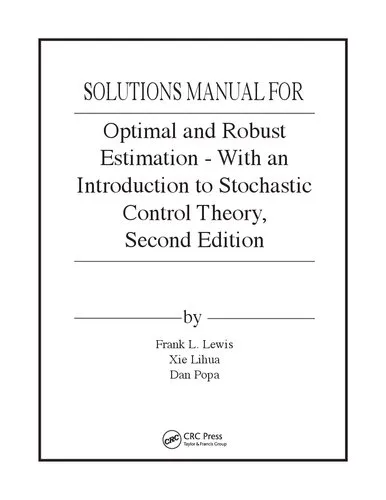Optimal and Robust Estimation: With an Introduction to Stochastic Control Theory, Second Edition (Solutions, Instructor Solution Manual)
4.5
Reviews from our users

You Can Ask your questions from this book's AI after Login
Each download or ask from book AI costs 2 points. To earn more free points, please visit the Points Guide Page and complete some valuable actions.Introduction
The second edition of Optimal and Robust Estimation: With an Introduction to Stochastic Control Theory continues to provide a comprehensive and self-contained guide to the principles of estimation theory, particularly in the context of dynamic systems and robust control. Written by Frank L. Lewis, Lihua Xie, and Dan Popa, this book is an essential resource for graduate students, researchers, and practitioners in the fields of control systems, signal processing, and applied mathematics. Carefully structured with theoretical depth and practical applications, this text also includes an instructor solution manual that makes it an invaluable teaching and learning aid.
The book addresses fundamental aspects of optimal and robust estimation, including Kalman filtering, robust state estimation, and stochastic control. With its second edition, significant enhancements have been made to enrich the reader’s understanding, including updated examples, refinements, and advanced topics. This introduction will delve into a detailed summary of the book, key takeaways, famous quotes, and an explanation of why this book holds a vital place in estimation theory and control systems literature.
Detailed Summary of the Book
The book is grounded in providing both foundational concepts and advanced techniques for optimal and robust estimation. The authors start by covering the basics of stochastic processes, probability theory, and least-squares estimation, ensuring that readers possess a robust mathematical foundation. The Kalman filter, one of the core topics, is discussed extensively, including its various modifications like extended and unscented versions, which have applications in nonlinear systems. This discussion is followed by an exploration of the mathematical derivations and physical insights underlying these filters’ operations.
A significant portion is devoted to robust estimation, targeting systems that might face uncertainties and model discrepancies. Techniques such as H-infinity filters and their role in ensuring estimation accuracy despite system noise and parameter uncertainties are explored in detail. The stochastic control theory section provides an introduction to the optimal control of stochastic systems, linking estimation with decision-making in dynamic environments. Throughout the text, the authors prioritize not just understanding, but also implementation, with examples and exercises that deepen practical and conceptual knowledge.
Moreover, the book introduces readers to practical computational methods used in real-world applications. Step-by-step derivations, MATLAB examples, and solutions to complex problems make the material relevant for engineering applications, including navigation systems, robotics, and communications networks.
Key Takeaways
- Comprehensive Coverage: The book provides a detailed exploration of both optimal and robust estimation techniques, demonstrating their applications and limitations.
- Integration with Stochastic Control Theory: A well-structured introduction to the intersection of estimation and control, which is critical for dynamic system analysis and design.
- Mathematical Rigor: Each method is derived rigorously, promoting a deep understanding of theoretical underpinnings.
- Practical Relevance: Emphasis on real-world applicability, with numerous examples and exercises to illustrate implementation.
- Instructor-Friendly: The inclusion of an instructor solution manual makes it a versatile tool for classroom use.
Famous Quotes from the Book
"Estimation is the cornerstone of modern control theory, transforming measurements into actionable insights."
"The power of the Kalman filter lies not only in its theoretical elegance but also in its practical utility across disciplines."
"Robust estimation ensures that even in the presence of uncertainty, engineering systems can be designed to perform reliably."
Why This Book Matters
With the ever-growing complexities of modern engineering systems, estimation techniques have become indispensable in ensuring reliable and accurate system performance. Fields like autonomous vehicles, aerospace navigation, and robotics heavily rely on the principles outlined in this book. The second edition of Optimal and Robust Estimation provides not only the theoretical framework but also the computational tools required to foster innovation in these domains.
The book’s robust approach bridges the gap between academic rigor and practical application. It empowers readers to develop solutions to real-world problems while cultivating a deep understanding of the mathematical principles involved. Whether you are an academic researcher, an engineering student, or a seasoned practitioner, this book offers insights and strategies that are both timeless and highly relevant in today’s fast-paced technological landscape.
Free Direct Download
Get Free Access to Download this and other Thousands of Books (Join Now)
For read this book you need PDF Reader Software like Foxit Reader


